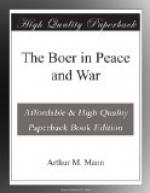On another occasion, a Boer, the extent of whose wealth was probably unknown to himself, found it necessary to dispute certain items in his account with his storekeeper. This sort of thing, by the way, is the rule and by no means the exception. It seems natural also when it is noted that the majority of Boers run twelve-monthly accounts, and by the time they come to square up, they find a difficulty in recognising some of the articles purchased eleven or twelve months previously. This particular gentleman’s argument had reference to a pair of spurs, which he deposed had been given to him as a present by the manager, and his hitherto good opinion of the clerk who had charged the spurs in his account was permanently damaged. He said he wasn’t a man of that sort. If he wanted to buy spurs, he could pay cash down for about fifteen thousand pairs and, in short, he could buy up all the spurs in the country! He would pay for those spurs now: he wouldn’t take a pair of anything, gratis or otherwise, from that merchant as long as he lived. He would go home and put eight horses into his wagonette and drive round the country and tell all his friends about that pair of spurs, and he wouldn’t rest until he had completed the task to his own satisfaction.
The book-keeper tried in vain to calm him down by presenting him with a bunch of grapes, but he only regarded the peace-offering with extreme contempt. He wanted to know what else he had been charged with, and the clerk, in conciliatory tones, proceeded to read over the several items. He came to ‘one pound of tea.’ That was the last straw.
’What! a pound of tea—a pound! Almachtig! Ik koop thee bij de zak (I buy tea by the bag).’
The suspicious nature of the Boer is always in evidence, although the Englishman must perforce humour it. It would be interesting to learn, for instance, how many thousands of pounds are sewn up in mattresses all over the country because the owners are chary concerning the integrity of bank-managers. They have no doubt whatever but that a bank is a paying concern (one Boer entered a bank recently and wanted to see the place where they made the money), but they would much rather keep their own money out of it, in case it should get mixed up with the earnings and savings of other people and be lost. The story runs that one old vrouw journeyed to town in her waggon one day for the express purpose of depositing L300 with the local bank, but when she found that they wanted to give her so much for keeping it (interest) instead of asking her to pay a small amount by way of compensation for taking charge of her money, she became suspicious and took her L300 back to the farm and the double grass mattress once more. It is unnecessary to state that this particular lady never trusted another banking institution.
[Illustration: Waggons crossing River]
And so it is with other things. When once you have aroused suspicion in the Boer—and it sleeps lightly—you can safely say good-bye to him for ever. He knows within his heart that the English are bent upon taking advantage of him, and when a man makes up his mind like that he is seldom disappointed.




